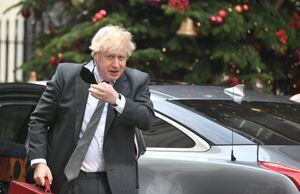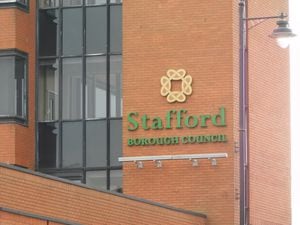Challenges mount for PM as country braces itself for bumpy ride in 2021
For Boris Johnson, 2021 was going to be the year when everything would change for the better.

On New Year’s Eve, addressing a nation exhausted by lockdowns and restrictions on personal freedoms, the PM promised that a return to the “everyday things that now seem lost in the past” was within touching distance.
It was a positive note on which to end a thoroughly wretched year, but within days the message had changed.
A new strain of Covid was running rampant, case rates were through the roof and hospital intensive care units were starting to fill up at a rapid rate.
It was as if the clock had been turned back, and Mr Johnson could be forgiven for experiencing an acute sense of déjà vu.
Twelve months earlier he had been on the crest of a wave following the Tories crushing win in the general election.
The Labour opposition was plunged into turmoil, as the inept Jeremy Corbyn sloped off to the backbenches after finally realised that most people didn’t like him very much.
Mr Johnson’s huge parliamentary majority meant passing legislation would not be a problem, and for the first time in a long time, Conservative MPs were united behind their leader.
Before January was out Britain had at long last departed the EU, drawing the curtain on the years of political wrangling that followed the Brexit vote.
The PM sought to set his stall out: he would be a leader for the whole country, with a “levelling up” agenda that would shift investment away from London and into the long-ignored regions of the Midlands and the North.
It seemed that after a run of truly miserable years new life would finally be breathed into the bloated corpse of British politics.
But within weeks the Covid outbreak in China had begun to ravage the UK, and most of Mr Johnson’s grandiose plans were put firmly on the backburner.
The virus has, of course, gone on to dominate the nation’s political landscape – a state of affairs that will continue long into the future.
It will be at the centre of many of Mr Johnson’s challenges in the second full year of his premiership, most notably when it comes to resurrecting the country’s battered and bruised economy.
Over the past 10 months the PM has attempted to walk a tightrope between propping up the economy and attempting to minimise health risks – an impossible balancing act that draws critics whatever decision is taken.
Too many restrictions hurts business; too few and more people die.
Billions of pounds have been spent protecting jobs with furlough and business grants and loans, yet the funding is unlikely to succeed in preventing mass unemployment and the disappearance of thousands of firms.
It means one of Mr Johnson’s key policy pledges – to bridge the gap between the have’s and the have not’s – is yet to catch fire.
The Towns Fund, launched in Wolverhampton by Robert Jenrick MP with the aim of revitalising struggling high streets, has been slow to materialise, with many places receiving much less cash than they had expected.
Long mooted plans to build new schools are yet to be unveiled, and there are already signs that the controversial HS2 line may be scaled down.
The Government has also faced widespread criticism over its handling of the pandemic.
The mass testing scheme has hardly run smoothly, while U-turns have become regular and in many cases, highly predictable.
In the summer we were told to “eat out to help out”, then weeks later we were not allowed to eat out at all.
The tiered system of restrictions was backed to the hilt and then summarily scrapped.
There was an abrupt about turn on free school meals, and only last week schools were advised to open on one day before being closed the next. Summer exams that were definitely happening, aren’t.
The list goes on.
Mr Johnson says he has had little choice but to fine tune the country’s response to a constantly changing situation, but you would have to be a fool to believe that planning could not have been better.
The question is, how much of an impact has all of this had on Mr Johnson’s grip on power?
Well, seemingly very little.
The Conservatives remain either level pegging or marginally ahead of Labour in the polls, perhaps suggesting that Sir Keir Starmer’s revamped party is yet to make much headway with the British public.
And according to YouGov, Mr Johnson’s personal approval ratings are broadly the same now as they were 12 months ago.
Although support for the Government’s handling of the pandemic has plummeted over the past two months, four out of five people polled last week said they were in favour of the latest lockdown.
Mr Johnson also has an ace in his hand in the form of Brexit.
Three times now the PM has defied the odds and done what his political opponents insisted he would not be able to do.
In 2019 he thrashed out a new withdrawal agreement that most Tory MPs could get behind, before easing it through the Commons on the back of his general election win.
Perhaps most impressively, he secured a trade agreement with the EU that ticked the right boxes for even the most ardent Brexiteers.
While the Scottish nationalist bampots voted against the deal – effectively backing the ‘no deal’ Brexit they said would be so “catastrophic” for the UK – for millions of Brits there was relief all round.
Not that you’d know it if your only source of news was our national broadcasters, who were left desperately hoping for massive queues of lorries to appear at the ports.
By delivering Brexit Mr Johnson has done precisely what his blue collar supporters had demanded, earning himself a job lot of political capital in the process.
Ministers have been busy setting up trade deals with other nations around the globe, but challenges remain in the months ahead, with the early impact of the deal with the EU likely to start to hit home by summer.
Before that, we will know if the UK’s mass vaccination programme has been a success.
It has been a point of great pride that the UK has been the first nation to distribute the jab on a large scale, but the PM’s target of getting almost 14 million people done by the middle of next month will be no easy feat.
Big tests will also come for the Conservatives in May, when local council elections take place alongside polls for regional mayors and police commissioners.
There is a school of thought that the PM’s gusto for his role may be on the wane.
He became a father again last year, as Covid brought him his own brush with death, adding to pressures the likes of which have been faced by few other peacetime leaders.
Key personnel including Lee Cain and lockdown-breaker Dominic Cummings have gone, leading some to question the influence Mr Johnson’s fiancée Carrie Symonds is having on the day-to-day running of his administration.
There is talk in Whitehall that Mr Johnson may be ready to hand over the reins to someone else once the worst of the pandemic is behind us.
However, with Mr Johnson still broadly popular with Tory MPs and supporters, there is not yet a suitable pretender to the throne.
Chancellor Rishi Sunak – arguably one of a small number of Cabinet ministers to shine in recent months – certainly appears to have been laying the foundations for a stab at the top job, although he is generally seen as one for the future.
Then you have the usual suspects such as Michael Gove, Dominic Raab and Jeremy Hunt, none of whom have had the widespread appeal necessary in the past tilts at leadership.
If, as expected, Mr Johnson does stick around, then it is highly likely that he will reshuffle his Cabinet at some point this year.
He also has a number of key challenges ahead of him on foreign policy, including forging a relationship with new US President Joe Biden, who in the past has made it clear that he does not particularly like the cut of the PM’s jib.
However, Mr Johnson’s chances of making a good impression have undoubtedly been enhanced by his condemnation of Donald Trump’s role in spurring on the violence in the Capitol – even if Labour promptly condemned him for not being quick enough off the mark with his comments.
The fact that the UK holds the rotating presidency of the G7 group of industrialised nations this year will also give the Mr Johnson a major opportunity to woo world leaders.
The Prime Minister can portray himself as a world leader, able to mix it with the biggest politicians on the globe as he pushes the attributes of a newly independent Britain.
We can also expect a concerted effort to kick-start plans for the overhaul of social care, one of the PM’s main pledges when he became leader and an issue that has dogged the premierships of many of those before him.
Mr Johnson will be pleased to get 2020 out of the way.
But after a year when he has become accustomed to handling everything that is thrown at him, the PM knows that 2021 will be anything but an easy ride.





